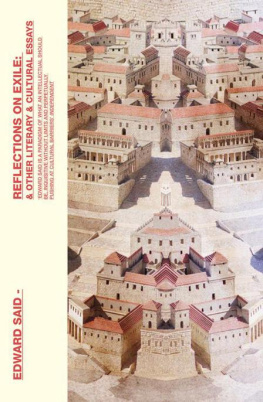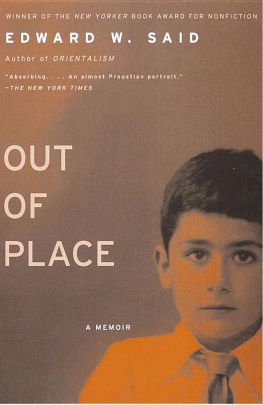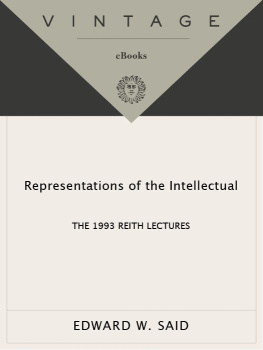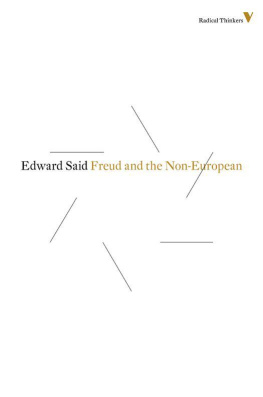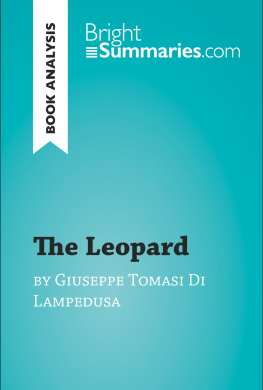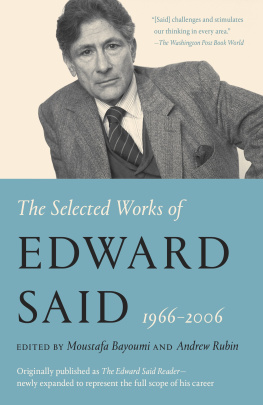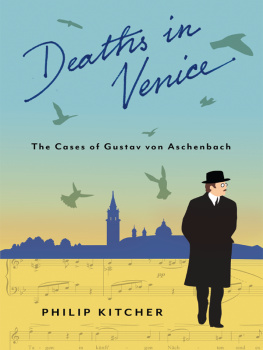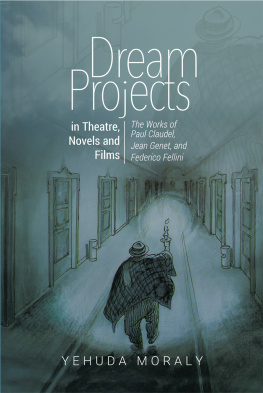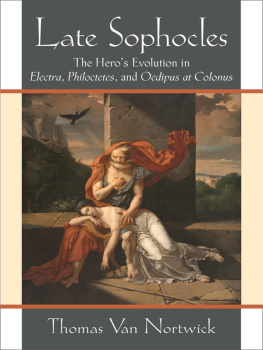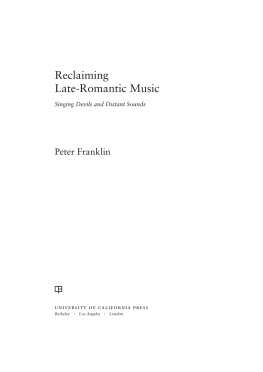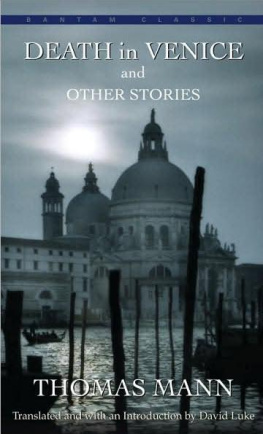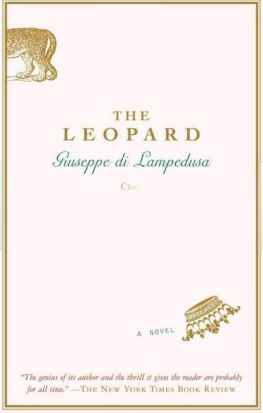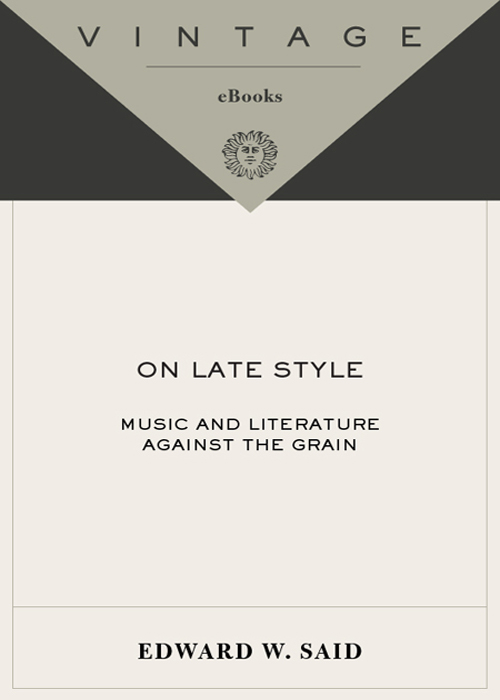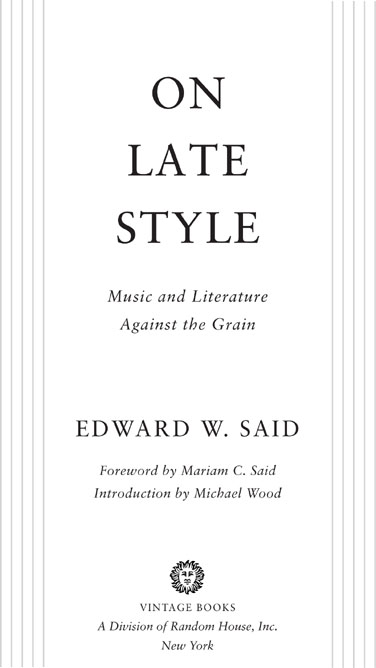ON LATE STYLE
Edward W. Said
Edward W. Said was University Professor of English and Comparative Literature at Columbia University. He was the author of more than twenty books, including Orientalism, which was nominated for the National Book Critics Circle Award; Culture and Imperialism; Representations of the Intellectual; The End of the Peace Process; Power, Politics, and Culture; and Out of Place: A Memoir. His books have been published in thirty-six languages. He died in 2003 .
ALSO BY EDWARD W . SAID
Joseph Conrad and the Fiction of Autobiography
Beginnings: Intention and Method
Orientalism
The Question of Palestine
Covering Islam
Literature and Society (editor)
The World, the Text, and the Critic
After the Last Sky (with Jean Mohr)
Blaming the Victims (editor)
Musical Elaborations
Culture and Imperialism
The Politics of Dispossession
Representations of the Intellectual
Peace and Its Discontents
The Pen and the Sword
Entre guerre et paix
Henry James: Complete Stories, 1884-1891 (editor)
Out of Place: A Memoir
The End of the Peace Process
The Edward Said Reader
Reflections on Exile and Other Essays
Power, Politics, and Culture: Interviews with Edward W. Said
Parallels and Paradoxes: Explorations in Music and Society (with Daniel Barenboim)
Humanism and Democratic Criticism
From Oslo to Iraq and the Road Map
CONTENTS
FOREWORD
Edward was in the process of writing this book when he passed away on Thursday morning, September , 2003 .
In late August we were in Europe: first in Seville, where Edward participated in the West Eastern Divan workshop, and then in Portugal visiting friends, when he fell ill. We returned to New York a few days later, and after three weeks of high fever he began to pull through. He felt well enough to resume work Friday morning, three days before his illness took over for the last time. He said to me as we were having breakfast that morning, Today I will write the acknowledgments and preface to Humanism and Democratic Criticism (the last book he finished, which was about to come out). The introduction to From Oslo to Iraq and the Road Map Ill finish by Sunday. And next week Ill concentrate on completing Late Style, which will be finished in December. All this was not meant to be. However, Edward left us a tremendous amount of material on this book to allow us to finish it and produce posthumously a version of what he had in mind.
My recollection is that this ideawriters, musicians, and other artists late works, late style, Adorno and lateness, etc.became part of Edwards conversation sometime at the end of the 1980 s. He had begun to be interested in this phe- nomenon and was engrossed in reading about it. He discussed it with many friends and colleagues and began to include examples of late works in many of his articles on music and literature. He even wrote specific essays on the late works of some writers and composers. He also gave a series of lectures on late style, first at Columbia and then elsewhere, and in the early 1990 s he taught a class on the topic. Finally he decided to write a book and had a contract in hand.
This book would not have been possible without the help of several devoted people and friends. My family and I are more than indebted to them for their contribution toward this endeavor.
Our thanks first and foremost go to Sandra Fahy, Edwards assistant, whose help and dedication were crucial in assembling the material that went into this book. We are also grateful to Andrew Rubin, Edwards student and former assistant, who kept detailed notes, was very resourceful, and directed us to various valuable sources of information. And to Stathis Gourgouriswho had long discussions on late style with Edwardfor his valuable time and willingness to share his ideas. To Shelley Wanger, Edwards editor, whose patience and perseverance we will always cherish, to Sarah Chalfant and Jin Auh at the Wylie Agency, and to Akeel Bilgrami, Edwards friend and colleague, who taught several seminars with him and who read the manuscriptto all of them go our heartfelt thanks. I also would like to thank the many friends and former students contacted who were very helpful with their time and information. Last but not least, this book would not have seen the light of day without two dear friends to whom my family and I are most grateful and will always be indebted for their love, generosity, and expertise. The person whose wisdom, advice, and meticulous reading of the material gave us the green light to proceed with this publication was Americas finest literary critic, as Edward always described his friend Richard Poirier. Richard oversaw this manuscript from beginning to end. The other person who labored on and edited this manuscript with a fine-tooth comb and devotion is our close friend Michael Wood. He has done a superb job of not only editing the essays and arranging the material, but also putting it all together without losing Edwards voice.
Mariam C. Said
New York, April 2005
INTRODUCTION
Death has not required us to keep a day free,1 Samuel Beckett writes with grim and intricate irony, suggesting both that death doesnt make appointments and that we can die just as well when were busy. But death does sometimes wait for us, and it is possible to become deeply aware of its waiting. The quality of time alters then, like a change in the light, because the present is so thoroughly shadowed by other seasons: the revived or receding past, the newly unmeasurable future, the unimaginable time beyond time. With such moments we arrive at the conditions for the special sense of lateness that is the subject of this book.
Its worth pausing over the delicately shifting meanings of the word late, ranging from missed appointments through the cycles of nature to vanished life. Most frequently perhaps late just means too late, later than we should be, not on time. But late evenings, late blossoms, and late autumns are perfectly punctualthere isnt another clock or calendar they are supposed to match. Dead persons have certainly got themselves beyond time, but then what difficult temporal longing lurks in our calling them late? Lateness doesnt name a single relation to time, but it always brings time in its wake. It is a way of remembering time, whether it is missed or met or gone.
Conversion of time into space, Edward Said wrote in one of his notes for a famous course he taught at Columbia, Last Works/Late Style. Opening up of chronological sequence into landscape the better to be able to see, experience, grasp and work with time. Adorno: fractured landscape as objective (Saids italics). The note goes on to mention several passages in Proust and three poems by Hopkins. All of the Proust passages come from the end of In Search of Lost Time, where the narrator is simultaneously enchanted by his new insights into the recoverability of the past and anguished at the shortness of the years or months that are probably left to him. He sees a person as a crossroads, time as a body, characters as duration, as Saids note says. With Hopkins, Said is thinking of the darkening landscapes the poet so loves, of the winter world that yields with some sighs, our explanation,2and above all, perhaps, of a terrifying picture of sleep and death as our only escape from the steep drops and fierce weather of the mind:


